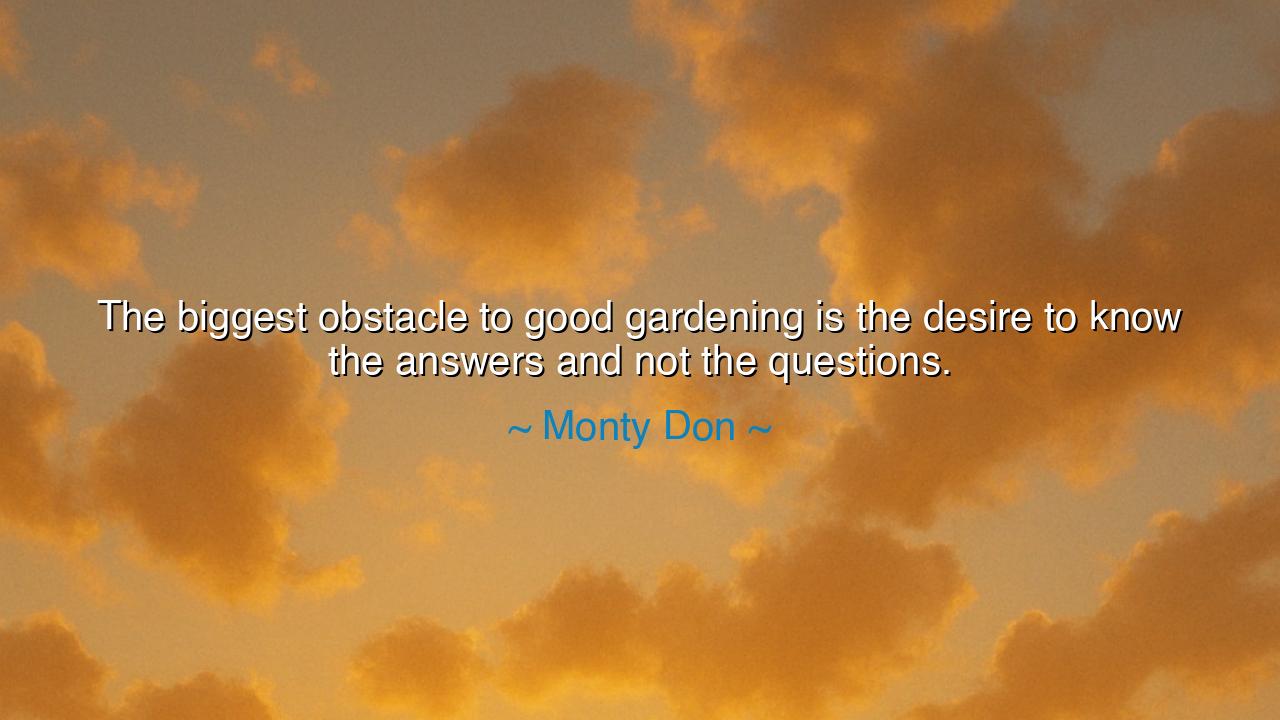
The biggest obstacle to good gardening is the desire to know the
The biggest obstacle to good gardening is the desire to know the answers and not the questions.






The words “The biggest obstacle to good gardening is the desire to know the answers and not the questions” were spoken by Monty Don, one of the most beloved gardeners and thinkers of our time. Beneath their gentle simplicity lies a teaching as old as humanity itself — that wisdom is not found in certainty, but in wonder. Don speaks not only of gardening but of life, of learning, and of the posture the soul must take before mystery. His garden, like a temple, becomes the ground of inquiry, and his statement echoes the voice of the ancients who taught that true understanding begins not with knowledge, but with humility before the unknown.
When Monty Don warns against the “desire to know the answers,” he exposes the human tendency to rush toward control, to replace curiosity with certainty. The modern mind, impatient and proud, often demands immediate solutions: why this plant failed, why that one thrived, what formula guarantees success. Yet the garden does not yield to formulas; it yields only to attention. It thrives on observation, not command. In our hunger for answers, we forget that every seed conceals a secret that no human hand can fully explain. Growth, decay, renewal — these are mysteries that invite participation, not mastery. Thus, Don reminds us that the gardener’s greatest tool is not knowledge, but wonder.
His emphasis on the questions restores the sacredness of learning. The true gardener asks: What does this soil need? What does this season teach? What is the rhythm of this place? These questions open the senses and the spirit. They create a dialogue between the gardener and the earth, between the self and the unseen forces that govern life. In asking, one begins to listen — to the wind, to the light, to the silence between things. For to question is to kneel before creation, acknowledging that one does not stand above nature but within her. Every wise soul, from philosopher to farmer, has begun their journey in this same posture of reverent curiosity.
Consider Socrates, the ancient Greek philosopher who called himself ignorant so that he might learn. He did not claim answers; he sought questions that awakened the soul. “The unexamined life,” he said, “is not worth living.” In much the same spirit, Monty Don teaches that the unexamined garden is not worth tending. One may produce flowers and fruit, yet without inquiry, without the humble dialogue with the earth, such beauty is hollow. Socrates turned ignorance into wisdom by questioning; the gardener turns soil into life by wondering. Both understand that truth does not descend upon the proud, but blossoms for the patient.
There is a quiet defiance in Don’s philosophy, a resistance to the modern obsession with control and perfection. Gardening, to him, is not about achieving mastery but cultivating relationship. When one seeks only answers, one treats the garden as an object; when one seeks questions, one becomes a participant in the living order of the world. The same applies to life: those who demand certainty often close themselves off from growth, while those who remain open to questioning evolve, adapt, and flourish. Just as no two seasons are alike, no two lives bear the same rhythm; only those who ask, listen, and adjust find harmony with time.
Monty Don’s wisdom also humbles the intellect. Even the most experienced gardener, he implies, will be confounded by nature’s surprises. A sudden frost, a blight, an unexpected bloom — each event becomes a lesson that no book can teach. To garden well, one must surrender the arrogance of knowing and embrace the grace of learning anew each day. In this way, gardening becomes a reflection of the spiritual life — an endless apprenticeship in patience, attention, and surrender. For in every question asked, the gardener grows alongside the garden.
The lesson is timeless: to live, to learn, to create — one must begin with questions, not answers. The spirit that seeks to understand rather than to control finds harmony with the world’s deeper rhythms.
Practical actions: Cultivate curiosity. When you face failure, do not rush to blame or fix, but to ask: What is this teaching me? In your work, relationships, and inner life, approach each moment as a living question. Walk among nature without trying to name or define everything you see. Let mystery be your teacher. For as Monty Don reminds us, the greatest gardeners — and the wisest souls — are those who listen more than they declare, who live not by certainty, but by the quiet joy of perpetual discovery.






AAdministratorAdministrator
Welcome, honored guests. Please leave a comment, we will respond soon